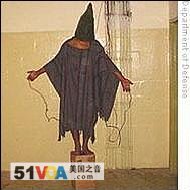Washington
23 March 2009
 |
| One of the photos showing the abuse of prisoners in U.S. custody at the Abu Ghraib prison in Iraq |
Writer and journalist Mark Danner is not saying how the 2007 International Committee of the Red Cross document, meant only for high-ranking Bush administration officials, came into his possession.
Last week, The New York Review of Books published excerpts of ICRC expert interviews with 14 detainees in an article by Danner, who says the similarities in the prisoners' stories are striking.
"What the International Committee of the Red Cross points to in its report is that, though the detainees had been kept strictly isolated, though they had had no contact with one another or anyone else for that matter beyond the interrogators - either in the 'black sites,' these secret prisons or in Guantanamo [Bay, Cuba] - still their accounts overlapped in very minute details, in large themes and in small details," Danner said.
Danner - who is the author of the book, Torture and Truth - says the allegations were made to the ICRC after the men were transferred to Guantanamo Bay detention center in Cuba in 2006.
Danner describes how the prisoners say they were held at various secret sites.
"The detainees were kept naked for weeks, months at a time - kept in very small cells, whose temperatures were kept artificially low, sometimes to the extent that the naked detainees, as one official said, seemed to turn blue," he said.
The first major terrorism suspect captured after the September 11, 2001 attacks on the United States was a Saudi-born Palestinian known as Abu Zubaida.
Mark Danner describes the interrogation techniques Zubaida and the other detainees say they were subjected to.
"They were shackled in place," he said. "Abu Zubaida was shackled to a chair for three weeks without moving so his legs became blistered."
Danner says the CIA interrogators tried to keep Zubaida constantly awake for the three weeks he was strapped to the chair, spraying water in his face if he fell asleep. The ICRC report says that all 14 detainees were subjected to sleep deprivation, beatings and suffocation with water, and that all of them were repeatedly smashed against the wall.
The report concluded that this described activity "constitutes torture" and that it also constitutes "cruel, inhumane and degrading treatment."
The neutral, Swiss-based ICRC has not denied the report referenced by Danner, but says it regrets the report was made public because it was confidential. The ICRC is responsible for making sure countries comply with the Geneva Conventions.
The leaked report has prompted the American Civil Liberties Union to call on President Obama's Attorney General, Eric Holder, to appoint an independent prosecutor to investigate the allegations.
Alex Abdo, who is with the ACLU's National Security Project, the new revelations are very important.
"They serve as official confirmation of what we have known for some time, which is that torture did take place and we know because the ICRC report had direct access to the people who were subjected to Bush administration's quote, unquote 'alternative set of procedures,'" he said.
While in office, President Bush acknowledged that the CIA used "an alternative set of procedures" on a small number of suspected terrorist leaders and operatives at overseas locations. Mr. Bush mentioned Abu Zubaida by name and insisted that the procedures were lawful.
Apart from the ACLU, several prominent newspapers and human rights organizations are calling on the Obama administration and Congress to investigate the treatment of detainees at Guantanamo Bay and other detention sites since 2001.
When asked about possible investigations, President Obama has said anyone who committed crimes should be prosecuted, but that his focus is on looking forward, not backwards.
Newsweek magazine reported Monday that President Obama is moving to publish three Bush administration Justice Department memos that would outline details of interrogation techniques of terrorist suspects for the first time.